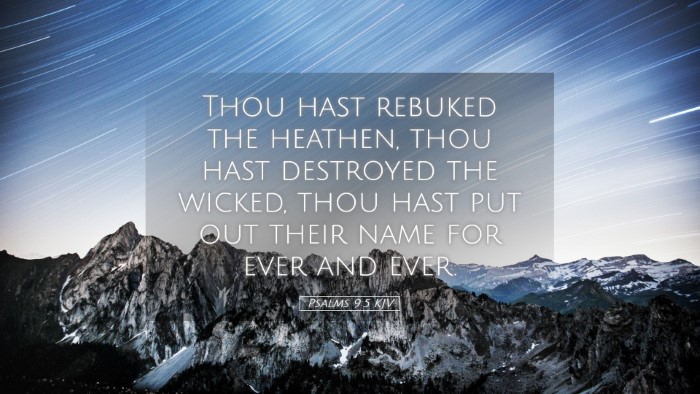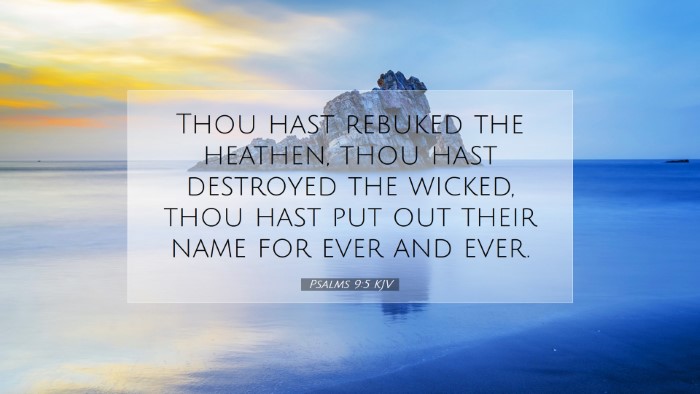Psalms 9:5 Commentary
Verse: Psalms 9:5 - "You have rebuked the nations, you have destroyed the wicked; you have blotted out their name forever and ever."
Contextual Overview
This verse is a part of a Psalm attributed to David, which expresses thanksgiving and praises to God for His just judgments and deliverance. It reflects on God’s sovereignty and the divine justice that prevails against the nations that oppose Him.
Thematic Insights
This passage encapsulates the themes of justice, divine authority, and the ultimate triumph of good over evil. David asserts the power of God against the oppressors and highlights the assurance that the righteous will be vindicated, while the wicked will face eternal consequence.
Exegesis of the Verse
Psalms 9:5 begins with the declaration of God's rebuke against the nations. The phrase "You have rebuked the nations" signifies God's direct intervention in human affairs. This indicates a judgment that brings to light the sin and injustice present among the nations.
Matthew Henry's Commentary
Matthew Henry interprets this verse as an affirming statement about God’s sovereign power over all nations. He elaborates that the rebuke signifies a harsh but necessary action from the Lord, demonstrating that He holds nations accountable for their deeds:
- Divine Justice: Henry notes that God’s justice ensures the triumph of righteousness, where nations and individuals who turn against Him will ultimately face repercussions.
- Eternal Judgment: The assurance that wicked names will be blotted out signifies the finality of divine judgment, emphasizing that those who defy God have no legacy in His kingdom.
Albert Barnes' Commentary
Albert Barnes provides a deeper understanding of the consequences faced by the wicked nations:
- Destruction of the Wicked: Barnes emphasizes that not only does God rebuke nations, but He also actively destroys them. The destruction serves as a reminder of God's omnipotence and His ability to obliterate any opposition.
- Blotting Out Names: When Barnes speaks of God blotting out names, he suggests a potent image of erasure, indicating a complete disassociation from God’s favor and remembrance, aligning with the finality of judgment.
Adam Clarke's Commentary
Adam Clarke delves into the linguistic and theological ramifications of the verse:
- Historical Context: Clarke references historical instances where God intervened in nations' affairs, providing evidence from Israel's history to demonstrate God's faithfulness in delivering His people.
- Philosophical Implications: Clarke brings forth a discussion on the nature of God’s justice and the philosophy of divine retribution, contemplating how God’s actions serve both as warning and assurance to humanity.
Theological Reflections
This verse serves as a powerful reminder of the moral order established by God. In reflecting upon Psalms 9:5, pastors and theologians can discuss the implications of divine justice in contemporary society:
- Relevance in Today's World: How do we see the principles of divine retribution playing out in current events? Can we identify nations that are facing the consequences of their actions, reflecting God's judgment?
- Encouragement for Believers: For Christians, this psalm can serve as an encouragement to remain steadfast in faith, trusting in God’s justice and moral order despite the apparent triumph of wickedness in the world.
- Call to Righteousness: There is a strong exhortation to righteousness; believing that God’s justice will ultimately prevail invites believers to pursue holiness and justice in their own lives and communities.
Conclusion
Psalms 9:5 encapsulates profound truths regarding God’s sovereignty, His just nature, and the fate of nations that oppose the divine order. The insights from public domain commentaries enrich our understanding of this scripture. For pastors, students, and scholars, it is a call to reflect on the importance of divine justice and the ongoing relevance of God’s judgments in our lives.


